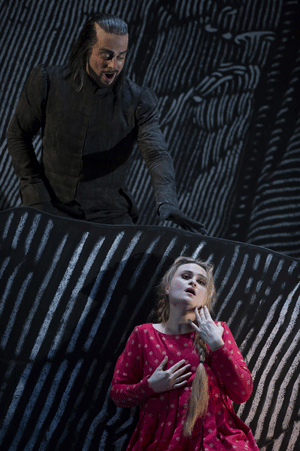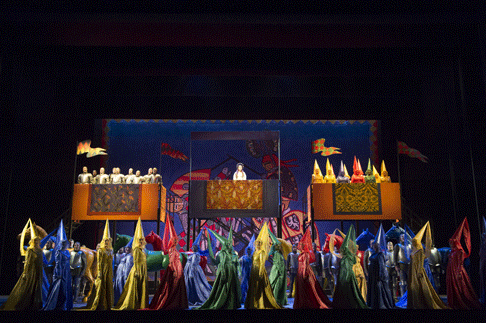True, Meyerbeer lacks the high melodic genius of Verdi,
whose every work is both obviously his yet paradoxically also has its own
unique sound world; but I think the problem is not that. We are out of sympathy
with the social world for which such works were conceived.
 Marina Poplavskaya as Alice and John Relyea as Bertram
Marina Poplavskaya as Alice and John Relyea as Bertram
Long, leisurely five-acters? Plots elevated to the level of the hieratic?
Above all comfortable plushness, with little apparent intellectual bite? All
that suited opera audiences of the time, but something more is needed for
survival, and you don’t have to listen very hard to discern it. Skill in the
construction of a theatre piece, to start with: how different do the two long
scenes between Bertram/Raimbaut and Bertram/Alice sound, for instance,
reflecting Bertram’s manipulation of each of these victims and their
differing reactions (no pushover, she); how each character is delineated
through the music, their unfolding scenas certainly not generic as is
the libretto; how atmospheric are the orchestral passages, even though perhaps
some might long for Weber.
All this would go for naught, of course, without a fine performance. Do you
ever have that feeling, when the lights dim and the first notes arise, that all
will be well this evening, and there is nowhere else you would rather be? It
was that way on Saturday last, softly bathed in pellucid sound (Daniel Oren
conducting) perfectly judged for the auditorium, without that muddiness that
often tells you you’re in for a sticky ride; above all the singers had the
measure of the style: to my ear French display opera has a certain chic
restraint, without the glitz of its Italian counterpart, and whilst Damrau
would have been starrier, Ciofi (yes, an Italian) was most touching, every
cadence perfectly placed. Poplavskaya excelled herself, with an unusual
combination of staunchness and thrilling ease; Hymel paid Meyerbeer the
compliment of taking him seriously, and was utterly believable in the role,
which he made seem child’s play to sing; Relyea has been seriously
undervalued, and Jean-Francois Borras was a delightful new discovery for me.
And the Chorus excelled themselves.
 A scene from Robert le Diable
A scene from Robert le Diable
Which brings me to Laurent Pelly’s production. When it comes to the
chorus, modern directors seem to model themselves on Eisenstein. Here there is
a difference: Pelly’s chorus is sometimes Greek, hovering en masse, but
always in articulated geometrical forms — think Pina Bausch dance, where we
see individuals impelled however to move in unison. So in Act 1 we see the
knights tightly choreographed but moving like lava when the occasion demands;
later they assume a diamond formation, as if grouped in a giant boardgame.
Sounds odd, maybe, but it has the effect of throwing the main characters into
individual relief, and aiding the flow of the plot.
The nuns’ music surprised me (I must have been confusing them with
Casanova’s); it is hard to guess what the original movement must
have been, but the costumes were closely modelled on lithographs of that time,
the music perhaps self-indulgently long and unvaried, the dancers nicely
distinguished even if all in the same plight. Only ten, on this big space? I
thought; but then the whole chorus flooded on, swamping the stage, even more
deshabilles, and equally frantic, in a splendid coup de
théâtre. Costumes might well have been taken from contemporary
miniatures; settings from prints of the time (the stage department excelled
itself in their manipulation).
I came away elated, thinking that the composer had achieved an integrated
piece of work on a high level, with that afterglow you get following a really
good meal. I guess that’s what the original audiences felt too. Will
Meyerbeer catch on? Don’t put money on it. Maybe you have to be a bourgeois
Marxist to like it?!
Kenneth Brown
Click
here for additional production information.


